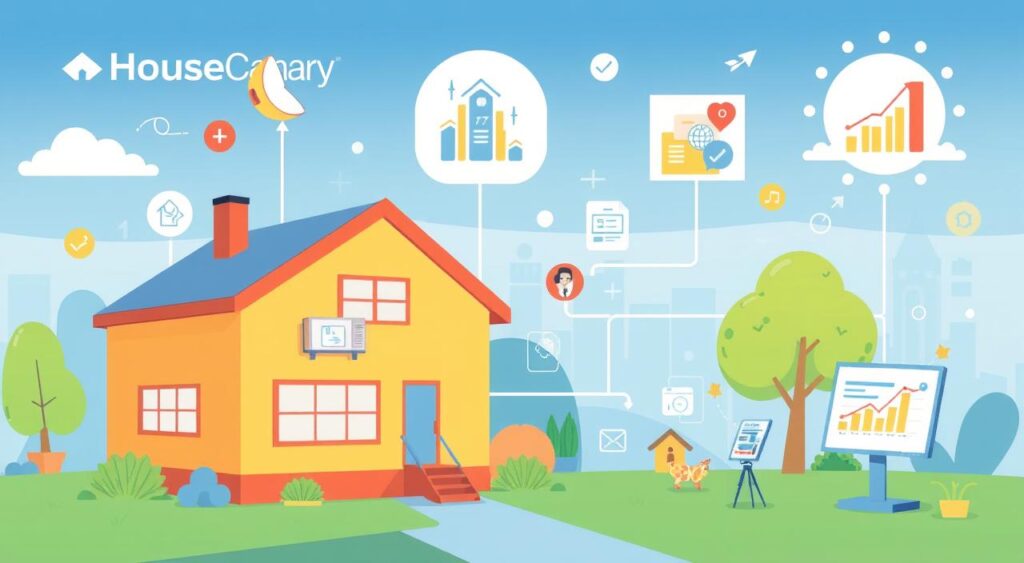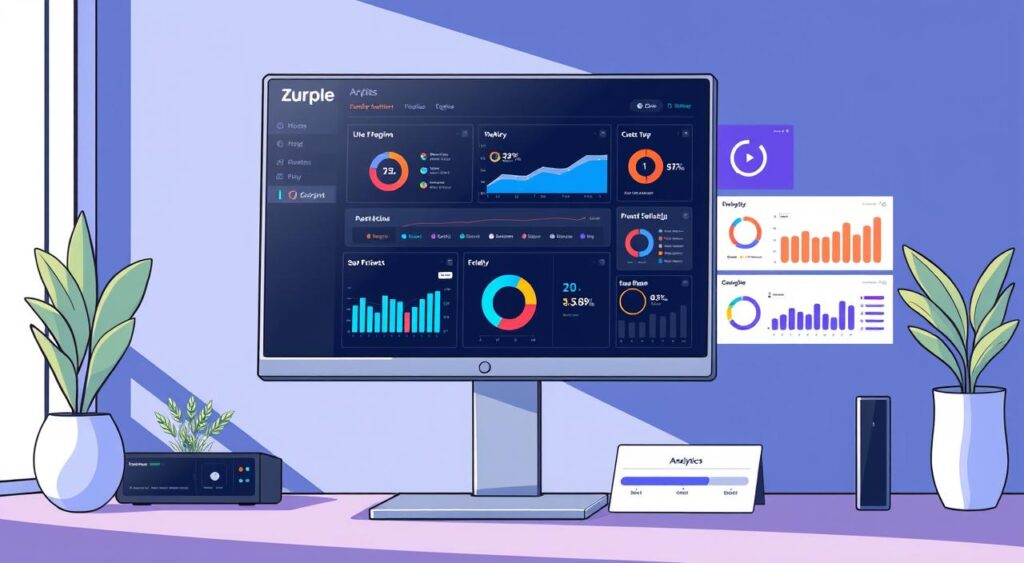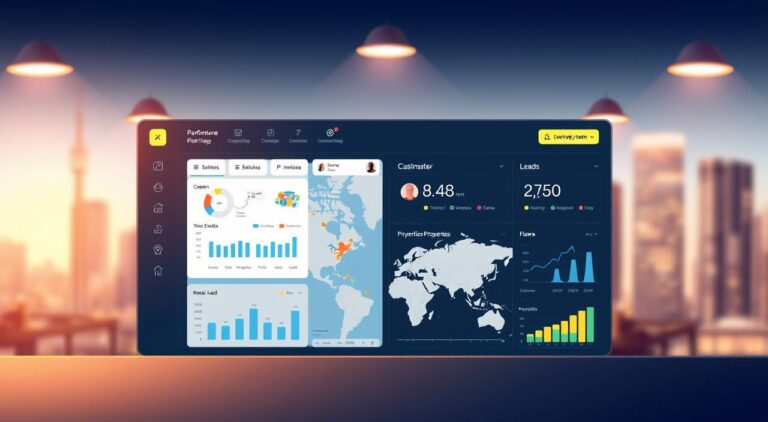Real estate automation tools for brokers 2025 USA Guide
The real estate landscape is rapidly evolving, with automation tools becoming essential for brokers to stay competitive in the 2025 market.
AI-powered tools are revolutionizing the industry by streamlining processes, automating tasks, and enhancing client interactions. According to industry insights, these tools help maximize efficiency, giving brokers more time to close deals.
As the industry continues to grow, brokers face increasing pressure to deliver faster, more personalized service. Automation tools are the answer to this challenge, enabling brokers to manage larger client portfolios effectively.
Key Takeaways
- Top automation tools for brokers in the USA
- How AI-powered tools enhance client interactions
- Streamlining operations with automation technology
- Driving business growth through automation
- Maximizing efficiency and profitability in 2025
The Evolution of Real Estate Automation in 2025
Real estate automation has come a long way, evolving from simple listing syndication to complex AI-driven platforms that now handle intricate tasks across the entire brokerage workflow. This transformation is revolutionizing the way real estate professionals operate, making processes more efficient and data-driven.
The convergence of multiple technologies—artificial intelligence, machine learning, big data analytics, and robotic process automation—is creating unprecedented capabilities for real estate brokers in 2025. These advancements are not only enhancing existing processes but also introducing new functionalities that were previously unimaginable.
The real estate technology market has matured significantly, with specialized tools designed specifically for the unique needs of brokerages rather than generic business automation solutions. This shift towards tailored solutions is a key factor in the rapid adoption of automation technologies within the industry.
Industry adoption rates have accelerated dramatically, with over 75% of successful brokerages now utilizing at least three automation tools as standard practice, compared to just 30% five years ago. This trend indicates a significant shift towards technology-driven business models in the real estate sector.
Current trends show a shift from standalone point solutions to integrated platforms that offer comprehensive automation across the entire client journey, from prospect to post-closing relationship management. As
“The most significant evolution has been the transition from tools that merely assist brokers to intelligent systems that can proactively recommend actions, predict market movements, and even handle routine client communications autonomously.”
The real estate industry is witnessing a new era of automation, where technology is not just a support tool but a driving force behind business success. As we move forward, the integration of AI and other advanced technologies will continue to reshape the landscape of real estate brokerage.
How Automation is Transforming the Brokerage Business
The real estate brokerage business is being reshaped by the advent of automation technologies. Artificial intelligence is becoming an integral part of how work gets done in commercial real estate, transforming the way brokers operate and deliver services.
Automation is fundamentally changing the brokerage business model by eliminating time-consuming administrative tasks that traditionally consumed up to 40% of a broker’s workday. By leveraging automation tools, modern brokerages can create scalable operations where growth is no longer directly tied to headcount, allowing for more efficient expansion and higher profit margins.

Client expectations have evolved dramatically, with buyers and sellers now expecting instant responses, 24/7 availability, and personalized service—demands that can only be realistically met through strategic automation. The competitive landscape has shifted to favor tech-forward brokerages that can deliver faster transactions, more accurate pricing, and enhanced client experiences through their automation capabilities.
Forward-thinking brokers are using automation not just for efficiency but as a strategic differentiator, showcasing their tech capabilities as a key value proposition to potential clients. Workflow optimization through automation is creating new roles within brokerages, with traditional administrative positions evolving into “automation managers” who oversee and optimize the digital systems.
The most successful brokerages are those that have found the optimal balance between automation and human touch, using technology to handle routine processes while freeing up agents to focus on relationship-building and complex negotiations. This balance is crucial in the real estate industry, where personal interaction and technology are not mutually exclusive but complementary.
By adopting automation tools, brokerages can streamline their workflows, saving time and increasing productivity. This transformation is not just about efficiency; it’s about creating a more client-centric business model that meets the evolving needs of the market.
Key Benefits of Real Estate Automation Tools for Brokers
Automation is transforming the real estate landscape, offering brokers unprecedented efficiency and productivity. By adopting real estate automation tools, brokers can significantly enhance their operations, leading to improved client satisfaction and increased profitability.
The implementation of these tools delivers dramatic time savings, with studies showing that properly configured systems can reduce administrative workload by up to 70%. This reduction in workload allows brokers to focus on high-value activities such as client relationship management and complex negotiations.

- Significantly reduces human error in critical processes like transaction management, contract preparation, and compliance documentation, minimizing legal and financial risks for brokerages.
- Enables brokers to scale their operations without proportional increases in staff, with leading brokerages reporting the ability to handle 40% more transactions using the same human resources.
- Improves client satisfaction metrics, with faster response times and more consistent communication driving higher referral rates and positive reviews.
- Facilitates data-driven decision making at scale, as automation tools collect, analyze, and visualize performance metrics that would be impossible to track manually.
- Increases productivity substantially when routine tasks are automated, allowing professionals to focus on strategic thinking, better decision-making, and stronger relationships.
- Enhances cost efficiency across the brokerage, with reduced paperwork, fewer errors requiring correction, and optimized resource allocation contributing to higher profit margins.
- Provides a competitive advantage in recruiting top agent talent, as tech-forward brokerages are increasingly preferred by high-performing agents who recognize the value of automation in maximizing their earning potential.
As noted by industry experts, “By adopting an AI-first mindset, you free up time from the mundane and focus on what truly moves the needle: strategic thinking, better decision-making, and stronger relationships.” This quote underscores the transformative potential of real estate automation tools in enhancing brokerage operations.
In conclusion, the key benefits of real estate automation tools for brokers are multifaceted, ranging from improved efficiency and productivity to enhanced client satisfaction and cost efficiency. As the estate industry continues to evolve, the adoption of these tools will become increasingly crucial for brokers looking to remain competitive.
Real Estate Automation Tools for Brokers 2025 USA: Top AI-Powered Solutions
In 2025, real estate brokers are turning to AI-powered tools to streamline their operations and stay ahead of the competition. The USA real estate market is witnessing a significant shift towards automation, with various platforms offering innovative solutions to enhance business efficiency and client engagement.
CINC: AI Lead Generation and Nurturing

Overview
CINC stands out as a premier AI-powered lead generation and nurturing platform for real estate brokers in 2025. Its AI assistant, Alex, intelligently categorizes leads into new, active, and old segments for more effective follow-up.
Key Features
The platform’s partnership with Structurely has resulted in remarkably human-like client interactions. Brokers report conversion rate improvements of up to 27% compared to traditional follow-up methods.
Pricing
CINC’s pricing structure is $899 per month for the software, plus a $200 per month added fee for AI tools. For teams, the cost is $1,299 per month, with custom pricing available for brokerage/enterprise clients.
Pros and Cons
Pros: Effective lead generation, human-like client interactions, scalable pricing. Cons: Higher cost for additional AI features, may require training for optimal use.
Top Producer: AI Farming Tools

Overview
Top Producer has evolved into a sophisticated AI farming tool that uses predictive analytics to identify potential sellers before they list, giving brokers a significant competitive advantage.
Key Features
The system’s multichannel marketing capabilities automatically deploy customized campaigns across various channels, creating multiple touchpoints that increase conversion rates.
Pricing
Top Producer is priced at $179 per month, offering an excellent return on investment for brokers focused on geographic farming.
Pros and Cons
Pros: Predictive analytics, multichannel marketing, cost-effective. Cons: Limited customization options, may require integration with existing CRM.
Lone Wolf: AI-Powered Email Communications

Overview
Lone Wolf provides comprehensive email communication automation that uses AI to personalize messaging based on transaction stage, client preferences, and previous interactions.
Key Features
The platform’s integration with transaction management systems ensures that client communications are always contextually relevant and timely.
Pricing
Lone Wolf’s pricing is $33.25 per month, making it an accessible entry point for brokers looking to begin their automation journey.
Pros and Cons
Pros: Personalized messaging, timely communications, affordable. Cons: Limited features in the basic plan, may require additional setup for transaction management integration.
Best Website Automation Tools for Real Estate Brokers
The real estate industry is witnessing a significant shift towards automation, with tools like Agent Image revolutionizing how brokers manage their websites. In this section, we’ll explore how Agent Image is leading the way in AI-powered website automation for real estate professionals.
Agent Image: AI-Powered Website Tools
Agent Image stands out in the market with its sophisticated AI-driven solutions designed specifically for real estate brokers. Its platform offers a range of automation features that enhance the online presence of brokers, driving more traffic and capturing high-quality leads.
Overview
Agent Image’s AI-powered website tools are designed to provide a seamless and engaging user experience. By leveraging advanced AI algorithms, these tools automate various aspects of website management, from property listings updates to personalized visitor recommendations.
Key Features
- Automatic IDX Integration: Agent Image’s AI ensures that property listings are updated in real-time, providing visitors with the most current information.
- Personalized Recommendations: The platform uses AI to offer personalized property suggestions based on visitor behavior, enhancing user engagement.
- Behavior-Based Email Automation: Agent Image tracks visitor interactions and triggers relevant email communications, significantly increasing lead capture rates.
- AI-Driven Market Data Integration: The platform automatically pulls and displays current market insights specific to the broker’s service areas, positioning them as local market experts.
Pricing
Agent Image offers tiered pricing plans to accommodate different stages of brokerage growth. The plans include:
- Agent Image X (Template): $99.99 per month + $599.99 setup fee.
- Agent Pro (Semi-Templated): Quote-based pricing for more customized solutions.
- Semi-Custom, Imagine Studio/True Custom: Quote-based pricing for highly tailored website designs and automation features.
Pros and Cons
Pros:
- Advanced AI-powered features for enhanced user experience and lead generation.
- Customizable solutions to fit different brokerage needs and budgets.
- Real-time property listings updates and market data integration.
Cons:
- Higher pricing tiers may be out of budget for smaller brokerages.
- Some features may require a learning curve for optimal use.
Data Analytics and Predictive Tools for Brokers
The real estate landscape is transforming with the advent of sophisticated data analytics and predictive tools designed specifically for brokers. These tools are revolutionizing the way brokers operate, from lead generation to client consultation.
Smartzip: AI Predictive Analytics

Overview
Smartzip is a leading AI predictive analytics tool that gives real estate agents a competitive edge by identifying potential sellers before they list their properties. By analyzing vast amounts of data, Smartzip’s algorithms flag homeowners who are likely to sell soon.
Key Features
Advanced Data Analysis: Smartzip analyzes over 2,000 data points per household, including property characteristics, owner demographics, and financial indicators.
- Accurate Seller Propensity Scores: Creates remarkably accurate scores to identify potential sellers.
- Targeted Outreach: Enables brokers to initiate conversations before listings reach the MLS.
- ISA Team Support: Smartzip’s team pre-qualifies leads, ensuring brokers focus on genuine selling intent.
Pricing
Smartzip’s pricing ranges between $299 per month and $999 per month, depending on the chosen features and service level, with a required 12-month contract.
Pros and Cons
Pros: Dramatically improves lead quality and conversion rates. Cons: Represents a significant investment, and the contract commitment may be a drawback for some.
HouseCanary: AI Valuation & Reporting

Overview
HouseCanary is a pioneer in AI-powered property valuation, using advanced algorithms to analyze public records and proprietary data sources. This results in highly accurate valuations that surpass traditional CMA methods.
Key Features
Interactive Reporting: Transforms complex market data into visually compelling presentations.
- Valuation Accuracy: Documented accuracy rates exceed traditional methods.
- Portfolio Monitoring: Automatically tracks value changes and market movements across multiple properties.
Pricing
HouseCanary offers a tiered pricing structure, starting at $19/month for basic access, making it accessible to brokerages of all sizes.
Pros and Cons
Pros: Highly accurate valuations, interactive reporting, and accessible pricing. Cons: May require training to maximize the platform’s capabilities.
Virtual Staging and Visual Marketing Automation
Virtual staging and visual marketing automation are revolutionizing how real estate brokers market properties in 2025. These cutting-edge technologies enable brokers to present properties in the most appealing way possible, without the need for physical staging.
Style to Design: AI Virtual Staging

Overview
Style to Design is a powerful AI virtual staging tool that transforms empty property photos into beautifully staged spaces, resonating with target buyer demographics. This tool is not limited to real estate agents and brokerages; anyone interested in listing marketing and image rendering can utilize it.
Key Features
Style to Design’s platform is trained on thousands of professionally staged properties, allowing it to understand spatial relationships and design principles. Key features include:
- Instant conversion of empty property photos into staged spaces
- Design intelligence for emotionally appealing interior presentations
- Cost-effective alternative to traditional staging
Pricing
Style to Design offers various pricing plans, including:
- Elevate: $99.99 per month (with a three-month commitment)
- Bi-annual: $500 every six months
- Annual: $999 per year
- Enterprise: Custom pricing
Pros and Cons
Pros: Cost-effective, instant results, and expertise development through the design academy.
Cons: Limited customization options for enterprise clients.
Canva (Magic Studio): AI Real Estate Marketing Design

Overview
Canva’s Magic Studio has emerged as an essential AI marketing design tool for real estate brokers, significantly reducing the time required to create professional marketing materials.
Key Features
Magic Studio’s features include:
- Magic Write for generating compelling property descriptions and social media captions
- Magic Design for transforming text inputs into professionally designed layouts
- Magic Media for creating custom imagery and short videos
Pricing
Canva Magic Studio pricing starts at $15 per month for Pro access, or $10 per user for teams.
Pros and Cons
Pros: Time-saving, professional results, and cost-effective.
Cons: Limited advanced features for complex designs.
AI-Powered Communication Tools for Brokers
As the real estate industry continues to embrace technology, AI-powered communication tools are becoming indispensable for brokers. These tools are revolutionizing the way brokers interact with clients, manage leads, and close deals.
Roof AI: AI-Powered Real Estate Chatbots
Roof AI has established itself as a premier AI-powered communication solution for forward-thinking real estate brokerages. Its sophisticated chatbot technology engages website visitors 24/7, providing a digital assistant that’s always available to greet visitors and initiate conversations.
Overview
Roof AI’s chatbot answers basic questions, qualifies leads, routes them to the right person, and nudges them toward the next step, whether that’s booking a showing or requesting a CMA. This ensures that brokerages and teams don’t lose business outside of office hours.
Key Features
The platform’s lead qualification capabilities automatically assess visitor intent, timeline, and preferences, ensuring that human agents only engage with prospects who meet predefined qualification criteria. Roof AI’s cross-channel workflows seamlessly integrate brokerage, mortgage, relocation, and recruiting functions, creating a unified communication experience.
- Advanced natural language processing to understand complex property inquiries
- GPT-powered “Roof Pro” feature for handling sophisticated conversations
- Instant engagement capabilities to increase lead capture rates
- Ability to route qualified leads to the appropriate team member
Pricing
Roof AI’s pricing is quote-based, and interested agents must contact sales for a quote. While this may seem unconventional, brokerages typically report ROI within 60-90 days based on improved lead capture and conversion metrics.
Pros and Cons
Pros: Roof AI’s instant engagement capabilities have been shown to increase lead capture rates by up to 40%. The platform’s ability to route qualified leads to the appropriate team member ensures that prospects receive the most relevant assistance.
Cons: The lack of public pricing information may make it difficult for some brokerages to assess the cost-benefit analysis upfront.
Emerging AI Agentic Platforms for Real Estate
Emerging AI agentic platforms are set to redefine the future of real estate automation. These cutting-edge technologies are introducing “digital coworkers” that can handle complex workflows, making them a game-changer for the industry.
CRE Agents: Digital Coworkers for Real Estate

Overview
CRE Agents is at the forefront of developing AI agents for commercial real estate, automating repetitive tasks across various functional areas such as asset management, acquisitions, and brokerage operations. These digital coworkers are designed to work autonomously, making decisions and adapting to changing conditions without constant human supervision.
Key Features
The platform boasts several key features that make it an invaluable tool for real estate professionals:
- Automation of Repetitive Tasks: CRE Agents automates tasks across 17 functional areas, significantly reducing manual labor.
- Integration Capabilities: The platform integrates seamlessly with existing brokerage systems, creating a unified workflow.
- Learning Capabilities: CRE Agents’ digital coworkers become increasingly effective over time, adapting to the specific processes and preferences of each brokerage.
Pricing
While specific pricing details for CRE Agents are not publicly available, early adopters have reported significant productivity gains, justifying the investment. For the most accurate and up-to-date pricing information, it’s recommended to contact CRE Agents directly.
Pros and Cons
The benefits of using CRE Agents include:
- Productivity Gains: Early adopters have seen productivity gains of 30-40%.
- Enhanced Efficiency: Automation of data-intensive and repetitive processes.
- Competitive Advantage: Forward-thinking brokerages can gain a competitive edge in operational efficiency and client responsiveness.
However, as with any emerging technology, there may be challenges associated with implementation and adaptation.
Automation Tools for Real Estate Marketing
Real estate marketing automation tools are revolutionizing the way brokers manage leads, client relationships, and overall marketing strategies. By leveraging these tools, brokerages can significantly enhance their operational efficiency and improve lead conversion rates.
Market Leader: Lead Generation and CRM

Overview
Market Leader offers a comprehensive all-in-one CRM that serves as one of the best real estate marketing tools for agents. It’s a lead generation system that focuses on client management and automation, featuring an intuitive dashboard for organizing client details and tracking touchpoints over time.
Key Features
- Integration with over 40 lead sources, including Zillow and Realtor.com
- Automated action plans for consistent follow-up with leads
- Centralized lead management system
Pricing
Market Leader pricing starts at $189/month for individual agents and $329/month for teams up to 10 users, with custom pricing for larger teams and brokerages.
Pros and Cons
Market Leader has established itself as a comprehensive automation solution for real estate marketing, combining powerful lead generation capabilities with a robust CRM system. While it offers scalable solutions, the cost may be a consideration for smaller brokerages.
Zurple: Automated Lead Nurturing

Overview
Zurple has revolutionized lead nurturing for real estate brokers with its behavioral analysis technology, tracking prospect activity and automatically triggering relevant communications based on their online behavior.
Key Features
- Library of over 200 personalized email and SMS templates
- Zip code-specific lead nurturing capabilities
- Lead tracking functionality for unprecedented visibility into prospect behavior
Pricing
Zurple’s pricing starts at $149/month, with an additional $799 setup fee.
Pros and Cons
Zurple’s automated lead nurturing capabilities allow brokers to demonstrate hyperlocal expertise automatically. While the initial investment is significant, brokerages report strong ROI based on improved lead conversion rates.
How to Choose the Right Automation Tools for Your Brokerage
The right automation tools can revolutionize your brokerage’s workflow, but choosing them requires a thorough understanding of your business requirements. To make an informed decision, it’s essential to assess your current workflow and identify areas that could benefit most from automation.
Consider your brokerage’s size and growth trajectory when selecting automation tools. Some tools are designed for small operations with straightforward needs, while others offer scalable solutions that can grow with your business.
When evaluating automation systems, consider their integration capabilities with your existing tech stack, including your CRM, transaction management system, and marketing platforms. Seamless integration is crucial for maximizing the effectiveness of automation tools.
- Assess your brokerage’s specific business model and specializations to determine the most suitable automation capabilities.
- Prioritize user-friendly interfaces and intuitive designs to ensure adoption by your team.
- Evaluate vendor support and training resources to ensure proper implementation and ongoing optimization.
- Look for platforms with robust reporting and analytics capabilities to measure the impact of your automation tools.
Budget considerations should include not just the subscription costs but also implementation expenses, training requirements, and potential productivity gains when calculating the true ROI of each tool. By carefully evaluating these factors, you can make an informed decision that aligns with your brokerage’s needs and enhances your overall workflow.
Seeking input from your agents and staff about their most time-consuming tasks and frustrating processes can provide valuable insights into areas where automation can have the most significant impact. This collaborative approach ensures that your automation strategy addresses the most critical areas of your operation, ultimately benefiting your brokers and enhancing your business efficiency.
Implementation Strategies for Real Estate Automation
Effective implementation of automation tools in real estate involves a multi-step process that begins with understanding your current workflows. To fully leverage the benefits of real estate automation, brokerages must develop a comprehensive implementation strategy that includes training and integration plans.
Successful implementation requires a strategic phased approach rather than attempting to transform all processes simultaneously. This involves beginning with a comprehensive audit of your current workflows, identifying high-volume, repetitive tasks that consume disproportionate time but deliver relatively low value—these represent the ideal first targets for automation.
Developing a clear implementation roadmap with specific milestones, responsible team members, and success metrics is crucial to ensure accountability and measurable progress. It’s also essential to invest in proper training and change management—the most common reason automation initiatives fail is inadequate preparation of the team members who will use the new systems daily.
Consider appointing “automation champions” within your brokerage who can serve as internal experts, troubleshooters, and advocates for the new tools. This can significantly enhance the adoption rate and effectiveness of the automation tools.
- Plan for integration challenges by involving your IT resources or consultants early in the process to address potential data migration issues, API limitations, or compatibility concerns.
- Implement robust testing protocols before full deployment, including parallel running of old and new systems to ensure data integrity and process reliability.
- Establish clear communication channels for feedback during implementation, allowing team members to report issues, suggest improvements, and share successful use cases.
Creating standardized documentation and process guides that clearly outline how the automated systems work, including troubleshooting steps for common issues, is also vital. Moreover, planning for ongoing optimization rather than viewing implementation as a one-time project will help the most successful brokerages continuously refine their automation tools based on performance data and evolving business needs.
By following these implementation strategies, real estate brokerages can ensure a smooth transition to automated systems, maximizing the benefits of their investment in real estate automation tools.
Future Trends in Real Estate Automation for 2025 and Beyond
As we approach 2025, the real estate industry is on the cusp of a technological revolution, driven by advancements in automation and AI. The future of real estate brokerage is set to be shaped by several emerging trends that promise to enhance operational efficiency, client engagement, and overall market competitiveness.
Predictive Analytics will become increasingly sophisticated, with AI systems capable of forecasting market movements, property valuations, and client behaviors with unprecedented accuracy. According to industry experts, this will enable brokers to make informed decisions, mitigate risks, and capitalize on emerging opportunities.
- Voice-activated interfaces will simplify brokerage operations, allowing for natural language commands to query systems, update records, and initiate workflows.
- Blockchain integration will gain momentum, streamlining transaction processes through smart contracts, reducing paperwork, and enhancing security.
- Augmented reality tours will become standard, enabling clients to visualize properties remotely with interactive elements.
The integration of Internet of Things (IoT) technology will connect smart home features directly to brokerage platforms, allowing agents to showcase home automation capabilities and collect property performance data automatically. This trend is expected to revolutionize the way properties are marketed and managed.
Furthermore, hyper-personalization of client experiences through AI will advance significantly, analyzing thousands of data points to tailor interactions based on individual preferences and communication styles. Autonomous transaction coordination will also emerge as a major trend, with AI systems managing the entire closing process with minimal human intervention.
As automation tools handle increasingly sensitive client and transaction information, data privacy and security features will become critical differentiators. Leading platforms will implement advanced encryption and compliance measures to safeguard sensitive data.
The future of real estate automation will also be characterized by cross-platform integration standards, enabling seamless data sharing between competing systems to create comprehensive automation ecosystems. Additionally, sentiment analysis capabilities will become standard in client communication tools, helping brokers respond more effectively to client concerns.
In conclusion, the future trends in real estate automation for 2025 and beyond promise to transform the industry through technological advancements, enhanced client experiences, and improved operational efficiencies. As the industry continues to evolve, brokers who adopt these emerging trends will be well-positioned to thrive in a competitive market.
Conclusion
In 2025, the real estate sector is embracing automation to streamline brokerage operations, enhance client experiences, and gain a competitive edge. The landscape of real estate automation tools for brokers offers unprecedented opportunities to transform their business operations.
By strategically implementing these tools, brokers can expect significant competitive advantages, including reduced operational costs, improved client experiences, and the ability to scale their business without proportional increases in staff. The most successful brokerages will be those that find the optimal balance between automation and human touch.
- The time to begin implementing automation is now—brokers who delay adoption risk falling behind competitors.
- The future of real estate brokerage is being shaped by technology, with artificial intelligence, predictive analytics, and autonomous agents playing increasingly central roles.
- The ultimate goal of real estate automation isn’t to replace the broker but to enhance their capabilities.
As we look toward the future, the pace of innovation in real estate automation will only accelerate. By embracing the tools outlined in this guide, forward-thinking brokers can position themselves at the forefront of the industry’s technological transformation, ready to thrive in the increasingly competitive and fast-paced real estate market of 2025 and beyond.
By leveraging these tools effectively, brokers can save time, increase efficiency, and ultimately drive their business forward.






